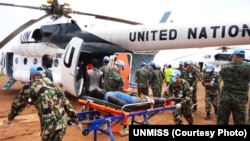The global rights group, Human Rights Watch, on Friday accused the army of South Sudan of committing "serious abuses against civilians in its anti-insurgency campaign in Jonglei state" and of taking sides in a bitter and deadly inter-ethnic conflict in the restive state.
“Yet again the government of South Sudan has utterly failed to stop armed Lou Nuer youth from moving into ethnic Murle areas, despite advance warnings that they were mobilizing,” said Daniel Bekele, Africa director at Human Rights Watch.
“This failure, together with a spate of serious abuses by soldiers in the area, only reinforces the perception that South Sudan’s leaders are taking sides in this ethnic conflict,” he said.
The rights group said soldiers shot three local chiefs and five other men in the town of Manyabol in late May, and have killed numerous civilians, including women and children, since the army launched an offensive several months ago against David Yau Yau, a rebel leader and an ethnic Murle.
Army spokesman Philip Aguer denied the accusations.
“The army has been fighting only insurgents. We do not fight civilians," he said.
"Any deaths of civilians that have been reported, we cannot accept because our soldiers have only been fighting the insurgents of Yau Yau. If there are people who are killed in crossfire then we need to examine that and see what happened and who was conducting operations in those areas.”
The total number of casualties from heavy fighting earlier this month between the Lou Nuer and Murle is not known, but on Monday, the South Sudanese army and the UN Mission in South Sudan (UNMISS) airlifted nearly 200 wounded Lou Nuer men to Bor, the state capital, for treatment, Human Rights Watch said.
"Injured Murle, presumed to be in the hundreds, have yet to be located," it said.
The French medical charity, Doctors Without Borders, has said it and the International Committee of the Red Cross have treated 176 patients in Bor, including 128 people with gunshot wounds.
Human Rights Watch accused the army of doing little to protect civilians in Jonglei, in spite of having a heavy troop presence in the state for the offensive against Yau Yau.
But Aguer defended the military, saying it did not have the capacity to stop tribal clashes, especially in remote areas.
“We cannot provide protection in every village because the type of village settlements we have are scattered, so that even if you have thousands of troops, it will be extremely difficult to protect each village," he said.
The U.N. Office for the Coordination of Humanitarian Affairs said Thursday that about 40,000 inhabitants have been displaced in Pibor county -- the heart of Yau Yau's insurrection and the army offensive to crush it. All six major population centers in Pibor have been abandoned, at least 8,500 Murle are estimated to have fled to neighboring countries and around 7,000 to Juba.
Yau Yau’s forces have contributed to the exodus and panic by attacking the town of Pibor and warning civilians to leave ahead of more threatened offensives.
But dozens of displaced Murle interviewed by Human Rights Watch said they fled their homes not out of fear of the rebels, but of further killings and looting by South Sudanese soldiers.
“We were hoping that the soldiers were coming to protect us (from Yau Yau’s forces), but instead they are killing us,” a Murle civilian from Pibor who fled to Juba was quoted as saying in the Human Rights Watch report.
JUBA, SOUTH SUDAN —







